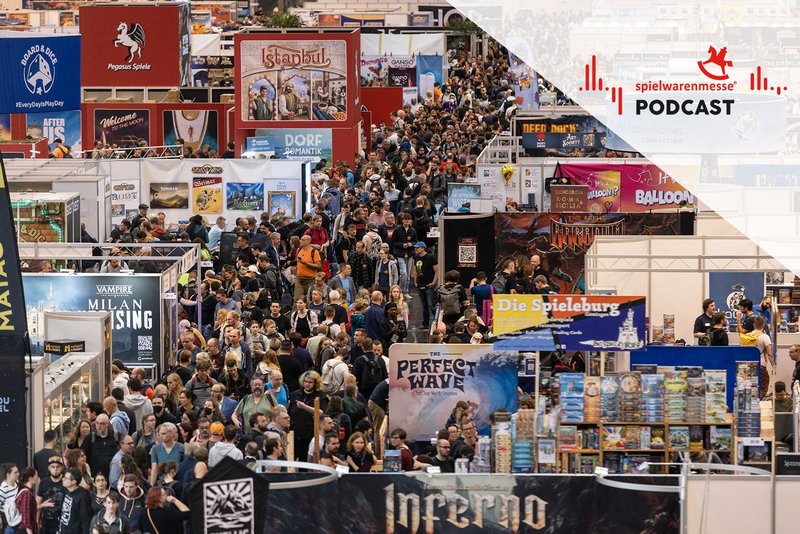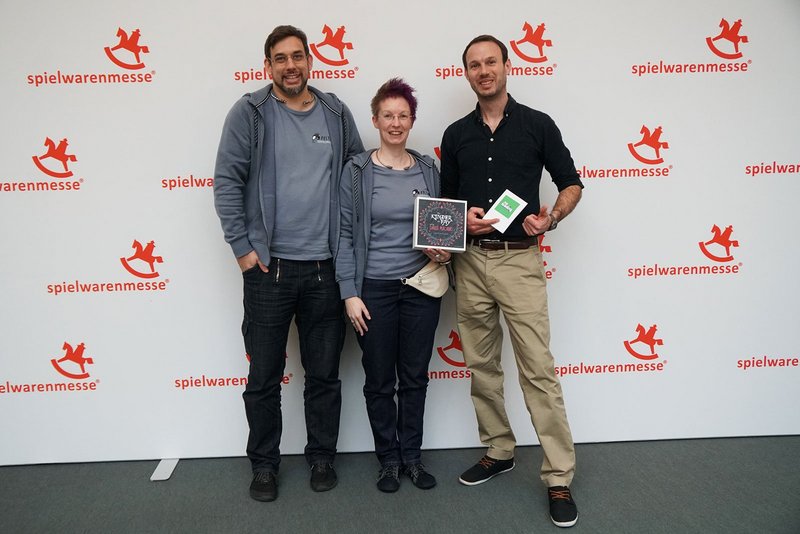
SPIEL 2024 in Essen: a platform for the international board games scene
A peek at new games from all around the world
By Peter Neugebauer
It’s fascinating to see how publishers from near, far and from very far afield develop and market analogue game ideas. At SPIEL 2024 in Essen, providers from 52 countries showcased a diversity of game design that would be inconceivable on a national level alone. A closer peek at them reveals that the games reflect culture and a horde of ideas. An entire fascinating world opens up.
Culture and nature

Fun at the amusement park. Plotmaker Games is based in Copenhagen, Denmark’s capital city. The place is home to one of the oldest and most famous amusement parks in the world, the Tivoli Gardens, which gives the family-friendly game its name: Tivoli. Everyone experiences the park in their own personal way. Visitors can take a leisurely stroll along quaint paths and give into temptation now and then. Others are more likely to take advantage of the many rides and have a whole load of fun on the carousel. Players set priorities based on the dice and score points at the end for the activities they have experienced.

Exploding fireworks. Rockets that light up the night sky are an attraction that draws in the crowds. The spectacular firework displays marking the Chinese New Year stand out in particular. French artists Alexandre Aguilar and Romaric Galonnier, together with illustrator Apolline Etiènne from Two Manta, dedicate themselves to this impressive display in their game Spring Festival. Everyone plays around with their own arrangement of fiery rockets, which have to be cleverly assembled so that chain reactions occur when they are ignited. When the sky blossoms in colourful explosions, certain formations score points. Over and over again.

On a photo safari in the Amazon jungle. The antithesis of artificial theme parks are the natural reserves that are popular with tourists who want to capture their sightings of animals in pictures. In Amazonia Park by Reiner Knizia, published by Korea Boardgames, from South Korea, this is done in an exotic and playful way. Players are out and about in the South American jungle to capture the beauty of the flora and fauna in a photographically realistic way. Being in the right place at the right time is the job of every nature photographer. This requires luck and intuition for the moment when the right animal card appears. Just like in the wild.

Howling with wolves. Wolves are at home in another ecosystem: the landscapes of North America. In Lone Wolves by Yasuyuki Nakamura and Anthony Perone, published by Wonderful World Board Games from Taiwan, they roam the steppes and forests and try to become the alpha of their own pack. In the process, they repeatedly clash with rival wolves. In this 2-player trick-taking game, the winner rises in the hierarchy, the loser creeps off with a scar. Various bonuses and tricks need to be explored in order to be used to their best effect. The alpha animal rules three out of five areas.
A new beginning and reconstruction

A new beginning. After a cataclysmic downfall, the world is in the process of being rebuilt. This is the scenario found in Rebirth by Reiner Knizia, published by the Maltese board game specialist Mighty Boards. The game is set in Scotland, where the ruined castles and palaces are being rebuilt. Tiles must be strategically placed on the board to create colourful tower battlements, thus engendering hope for a future in a completely renewed world, in which societies live in harmony with each other and with nature. The theme of the game is also a counterpoint to the almost daily horror stories of our reality.

The birth of a new continent. As Explorers of Navoria, Meng Chunlin of Dranda Games sends adventurers into uncharted territory. A new land mass has emerged from the sea. The aim is to gain this uncharted terrain as your own territory. As in the early days of humankind, life has to be sustained and encounters with different peoples explored. A mixture of card drafting, worker placement and land claims is required. You have to strike a balance between immediate advantages, permanent bonuses and points for the final score.

Cyberpunk up close. Guy-Roger Duvert, Benjamin Sjöberg and Cyril Villalonga of Swiss company Board Game Box lure you into this dark world in Virtual Revolution. After a failed technological revolution, everything plunges into chaos. Reality and the world of appearances can no longer be told apart. Corporations control virtual universes and those who control them wield power. The players try to drive society into their cyber world. This is a nasty game, but terrorists and Interpol are powerful opponents who are stirring up trouble. Worker placement is handled differently here. Appointed directors can influence areas that are coupled with the opportunities for promoting one’s position. It’s a tough game. A real fight.
Science and progress

The unconscious. Following in the footsteps of Siegmund Freud and his theory of exploring the unconscious mind, players take on the role of scientists on a quest to heal trauma patients. In its card game Dreamworld, Cyprus-based games publisher Fantasia offers players the chance to emulate the great psychoanalysts. The game designed by Jonny Pac is illustrated by Vincent Dutrait and Andrew Bosley. There are 66 dream cards that can afflict the clients. They must be resolved by combining forces. The aim is to achieve figures that reflect your success. However, the dream illustrations, which are outstanding in their own right, and the game’s unique theme make this game something extraordinary.

In the vastness of space. Are there alien life forms? SETI by Tomáš Holek and published by Czech developer Czech Game Edition explores this question. The search for extra-terrestrial intelligence has been fuelling scientific curiosity for decades. In a dynamic game setting, players explore space and use the latest technologies as head of a scientific institution. The game is controlled by a thick deck of cards that draws on real findings and, because of the abundance of material, promises a different outcome each time. The card effects are also varied and guarantee an excellent replay value.
Abstract ideas

Paving the way. For their game Calçada, Konstantinos Korogiamnis and Vangelis Bagiartakis took inspiration from the mosaic-like paving stones on Portugal’s sidewalks. Felix Wermke illustrated the game, which was published by Austrian games manufacturer Piatnik. First, the active player selects a stone and a colour from a common pool of rondels placed in the middle of the table. His choice affects the following player. This is a successful interactive moment. The active player then moves the selected rondel to their own playing area and wins a pattern tile that is placed on their own game panel. All this isn’t done randomly but intentionally in order to cleverly arrange paving stones. Both tactics and strategy are required.

Pyramid building. In Yaxha designed by Baptiste Vaiana and illustrated by Julien Bigot, published by the Swiss manufacturer Helvetiq everyone works on a 3D pyramid. Inspired by Mayan models, players build the structures on a rectangular floor plan. Step-like blocks are layered. All this isn’t embedded in some themed game, but follows the abstract construction of a pyramid. Players always bid secretly on three building blocks in a random mix of colours. The stones must then be embedded in the pyramid to score well. For example, a long row of colours is just one possible goal. Everyone has to react to what is currently available and pay attention to the ultimate goal of completing the pyramid.

Arabic Draughts. Draughts, or checkers, is a classic game played in many regions of the world. On the Arabian Peninsula, you’ll often see it being played on streets and squares, with the two opponents carving an 8 x 8 grid on the ground and using with stones as pieces. Abdulrahman Al-Homaid has established a version of the game with polished wooden figures called Dama which has been published by Majlis Shabab, a Qatari company. Similar to draughts, the aim is to move your own pieces to your opponent’s baseline and upgrade them with a crown once you get there. You can move and capture pieces in all directions as far as you like. However, the curious starting position triggers contact with opponents from the start.
Spielwarenmesse from 28 January to 1 February 2025
No sooner is the fair is over than it’s already back on the horizon: game publishers are now working hard on their next game releases, which they want to showcase at the Spielwarenmesse in Nuremberg. Start planning your visit now!
About the author
Peter Neugebauer is still a “big kid” through and through. In early childhood, his parents introduced him to board games. And games were obligatory and always welcome as presents for Christmas and on his birthday.He didn’t stop playing, not even during his years of study or working life. Early on, he reviewed new products, initially in trade journals, then also in daily newspapers and, for almost 40 years, in industry magazines. He can’t live without playing.




